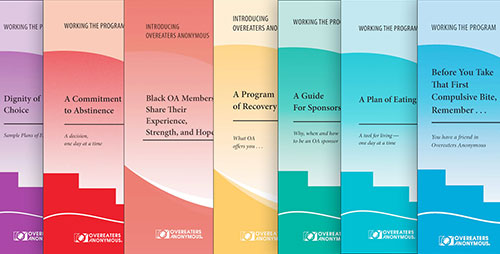Do you have patients who have an eating disorder or whose weight is causing health problems?
 Overeaters Anonymous may have the solution. Many people have found hope and relief from their eating issues. Overeaters Anonymous (OA) is a nonprofit organization patterned after Alcoholics Anonymous that offers a three-fold recovery program from the disease of compulsive eating: physical, emotional, and spiritual. The OA program is an anonymous fellowship open to anyone with a desire to stop eating compulsively; there are no dues or fees.
Overeaters Anonymous may have the solution. Many people have found hope and relief from their eating issues. Overeaters Anonymous (OA) is a nonprofit organization patterned after Alcoholics Anonymous that offers a three-fold recovery program from the disease of compulsive eating: physical, emotional, and spiritual. The OA program is an anonymous fellowship open to anyone with a desire to stop eating compulsively; there are no dues or fees.
OA is open to compulsive eaters of different types: people with compulsive overeating, anorexia, bulimia, and combinations of these. We come in all different sizes and shapes. Some of us come to OA from other recovery programs, and for others, OA is our first Twelve Step fellowship. Members are not required to follow any particular food plan, as there are many factors involved in determining what is nutritionally sound and adequate. We simply offer love and acceptance for everyone. Nor do we have opinions on any other medical or psychological needs.
Our members share their experience, strength, and hope along their path of recovery. Members are free to “take what they like and leave the rest.” OA does not compete with the professional community. In contrast, we claim no medical, nutritional, or psychological expertise. We suggest that interested members contact qualified professionals for help in these areas. We hope that this glimpse into OA will help you to refer your patients to us. Many people have reached a healthy weight and maintained it by following this program of recovery. We are willing to meet with you or your patients to discuss the program and our individual experience along the path of recovery, as long as our anonymity is not compromised. We must always maintain our individual anonymity at the level of press, radio, television, and other forms of public media.
If you would like to talk with someone, please contact us through our Region 5 Board and someone will contact you shortly. For more information, click on one of these links Basic Information about OA, To Referring Professionals, PSAs – Public Service Announcements.
Do you want more information or give one of your patients some information?
The following OA publications are particularly helpful to newcomers. These and other OA publications are available from the OA World Services Bookstore.
When Should I Refer Someone to Overeaters Anonymous? To Members of the Helping Professions
Use this colorful OA pamphlet to reach out to referring professionals, such as doctors, therapists, nutritionists, teachers, the clergy and others. With answers to such questions as “What is OA?” and “How Do Members Achieve and Maintain a Healthy Weight?” this pamphlet explains how OA complements professional care. OA’s “Fifteen Questions” are included to help the professional know if referring the person, they’re concerned about is appropriate. This pamphlet replaces OA pamphlets Introducing OA to Health Care Professionals and Introducing OA to the Clergy.
Is Food a Problem for You?
Intended for use in libraries, doctors’ offices, public information campaigns, outreach events, and anywhere prospective OA members might see it. Includes the OA Twelve Steps, member testimonials, and general information about OA.
Fifteen Questions
Are you a compulsive eater? Answer the questions posed on this flyer to find out. Now updated to reflect the expanded definition of abstinence, it’s a great tool for public information events.
To the Young Person
To the Young Person has been thoughtfully modernized to include all-new recovery stories—plus a classic testimonial—submitted by young OA members, for young OA members. This pamphlet covers a broad range of disease manifestations, including anorexia, overexercising, and compulsive food behaviors, and explores how these have adversely affected the physical, mental, and emotional health of the young OA authors. The fulfillment of OA’s promises of recovery is foregrounded and the life stories of the authors varied, making this pamphlet meaningful for OA members of all ages.
The best way for a patient to get to know OA is to attend one of our meetings.
If you would like to talk with someone, please contact us through the links on Region 5 Board.

